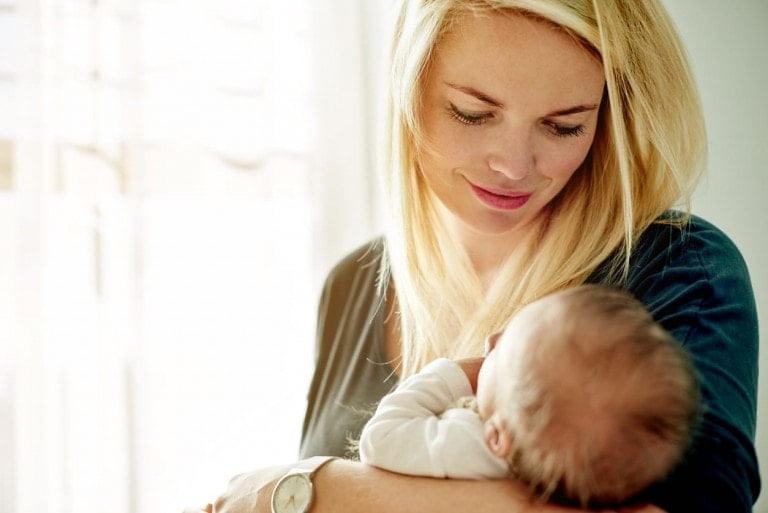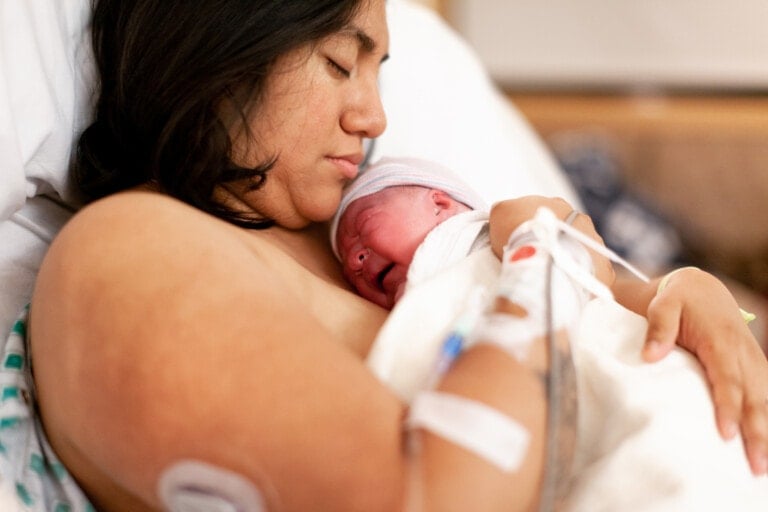It is no surprise that pregnancy and postpartum hormone changes can take us on quite the ride! During my education as a women’s health nurse, I learned quite a bit about the hormones responsible for these swings. But until I experienced it myself, I didn’t realize how much of an impact they could have on us. And everyone experiences them a bit differently.
These hormones can also affect women differently depending on what stage you are in your pregnancy and postpartum recovery. It’s essential to understand what happens to our hormones once your baby arrives to help you better prepare for what to expect!
Hormones During Pregnancy
Before we dive into postpartum hormone changes, let’s talk about our hormones during pregnancy. After we deliver our baby, it’s essential to understand that our hormone levels shift and change.
Two specific hormones play a vital role: estrogen and progesterone. These hormone levels rise dramatically during pregnancy. Something you may not realize is progesterone and estrogen are key in creating dopamine and serotonin, which may be why you feel calm and happy during your pregnancy! However, once our baby is born and the placenta is delivered, those levels plummet. This sudden shift can cause those feelings associated with “baby blues,” which we’ll talk about in a minute.
After our baby is born, hormones prolactin and oxytocin levels rise drastically, causing what I call a hormone tornado! It is a lot to cope with the rise and fall of these different hormonal shifts. It’s no surprise that many women feel emotionally fragile after the delivery of their babies. Let’s dig into the specifics of what is happening during these postpartum hormone changes.
Postpartum Hormone Changes
First Three Weeks
The first three weeks after delivery, you will likely feel a swirling of emotions—some wonderful and others not so wonderful. As I mentioned previously, the drop in progesterone and estrogen is to blame for those “baby blues,” making you feel like you have a mild form of depression and a bit down. You may experience sadness, mood swings, teariness, anxiety, insomnia, irritability, restlessness, and anger.
This may surprise you because so many of us expect to feel nothing but rainbows and butterflies. However, about 80% of new mothers will experience these emotions.1 Please know that you are certainly not alone. These feelings are considered normal, and they’re usually temporary. By the three-week mark, these emotions typically subside. If they don’t, I recommend reaching out to your care providers. This can be a sign of postpartum anxiety and postpartum depression, which is highly treatable!
Thankfully our bodies are making up for this drop in hormones by producing large amounts of oxytocin, also known as the “love hormone.” This will likely give you those warm and fuzzy feelings and strong motherly instincts when looking at and taking care of your precious new baby. I always tell my patients and clients not to be concerned if you don’t feel that immediate bond with your baby. It can happen for various reasons and isn’t anything to feel down and out about. It will come in due time.
Prolactin levels also rise after delivery, and they are to thank for our abundant breast milk production. However, prolactin can affect dopamine and cause moodiness, low energy levels, and slowed metabolism.
First Six to Eight Weeks
The first six to eight weeks after delivery are a significant adjustment period. Some of that has to do with adjusting to these hormonal shifts, but also lack of sleep, change in life roles, increased stress, and physical healing contributes to these major changes as well. Be patient with yourself and your baby, eat a well-balanced diet, sleep or rest when you can. Know that in time you will start to feel a bit more like yourself.
Keep in mind that while most mamas are cleared at six weeks postpartum to “resume” normal life, you may not feel ready, and that is normal! Low estrogen levels, which may remain low while breastfeeding, can contribute to hot flashes, pelvic floor dysfunction, low libido, and vaginal dryness. You might start to notice these symptoms around the six to eight-week postpartum mark if you hadn’t experienced them sooner.
Three Months Postpartum
Around the three-month postpartum period, estrogen and progesterone levels return to pre-baby levels. If you’re still breastfeeding or pumping, prolactin and oxytocin levels continue to stay elevated. However, the drop in estrogen levels may cause postpartum hair loss. Yes, just when you thought things were getting better, your hair starts to fall out, can you believe it!? Typically, our hair doesn’t fall out during pregnancy, but you may notice your hair falling out at astronomical rates around the three-month postpartum mark.
During this time, cortisol levels (the stress hormone) are also elevated along with a decrease in melatonin (the sleep hormone), which can cause feelings of anxiety and fatigue.
Six Months Postpartum
The most significant shift in postpartum hormones will occur around six months postpartum. This is typically when your baby starts drinking less breast milk because they are now eating solids and prolactin levels begin to decrease. You may find that your menstrual cycles return around this period of time if they haven’t already. If you’re not breastfeeding or pumping, your period will likely return a few months after your baby is born.
With the return of your menstrual cycle, you may feel various other symptoms. While you may start feeling a bit more like yourself around this time period, don’t be surprised if you’re not feeling one hundred percent “you” until around twelve months postpartum!
How You Can Help Regulate Your Changing Hormones
So you may be thinking, “This sounds terrible! Is there anything I can do to help regulate my hormones postpartum?” Here are my top tips for coping with postpartum hormonal shifts:
1. Education is key.
Educating yourself and knowing what to expect can help with expectations. I find that we all have this vision of what life with a baby will look like, and it is likely life probably won’t look like what you’re expecting! The more we know, the more prepared we are, and the less caught off guard we feel.
2. Sleep is crucial.
Sleep is healing for the mind, body, and soul and needs to be prioritized after having a baby. The lack of sleep can inhibit healing — physically, emotionally, and spiritually. So make sure you sleep as often as you can and take naps when you’re able.
3. Well-balanced meals.
Eating a well-balanced diet is more important than you can ever imagine, and that includes healthy fats and proteins. You will find you are hungrier and need the energy from healthy foods to carry you throughout the day, so focus on eating grass-fed meats, wild-caught fish, nuts and seeds, avocados, etc. Prepare foods during pregnancy, enlist the help of meal delivery services or create a meal train. Try avoiding heavily processed foods as consuming these can contribute to negative hormone shifts.
4. Ask for help!
Asking for help is a sign of strength, not weakness. Having your support system lined up is always a good idea. Postpartum is not a journey meant to be taken alone, and leaning into your support system is so important. This means having an IBCLC lined up if you’re planning on breastfeeding, having therapy appointments lined up if you have a history of anxiety or depression, joining a postpartum support group, or talking to your mom friends. And don’t be afraid to share your feelings with your partner.
5. Vitamins are still necessary.
Continue to take your prenatal vitamin. Even with our best efforts, it is likely that our diet won’t meet all our needs.
6. Hydrate, hydrate, hydrate!
Staying hydrated is so important in helping our bodies run as they should. It can also aid in the significant discomforts that come with hormone shifts.
7. Get some exercise.
Moving your body by partaking in gentle movements such as walking or doing a gentle postpartum yoga flow can also help in hormone shifts. As your healing improves and you feel ready, you can introduce more aggressive exercise. But please listen to your body and visit a pelvic floor specialist.
8. Think outside the box.
Seek out nontraditional medicine experts, such as acupuncturists, to help assist in hormonal shifts.
9. Be patient with yourself.
Lastly, be patient with yourself, your baby, and your partner. You are all learning together, and it will take time and practice to get into the swing of things.
Dealing with postpartum hormone changes can be very frustrating, especially when you don’t feel like yourself. Following these simple steps above can significantly help in dealing with the hormone tornado. Of course, please reach out for help to your obstetrician or primary care providers if you’re experiencing appetite or sleep changes, a decrease in interest in activities that once brought you joy, extreme sadness, rage, or anxiety. They can screen you for postpartum anxiety and depression and work with you to find your way back to yourself. You are an amazing mother, no matter what!






























